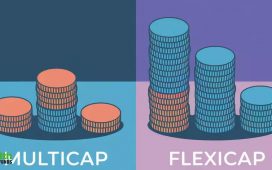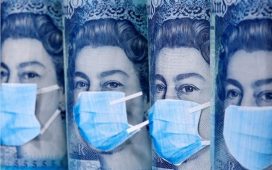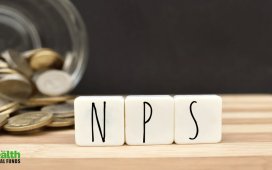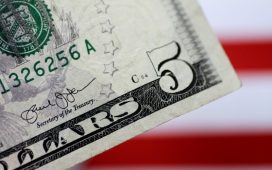
© Reuters. FILE PHOTO: A shop assistant counts piles of British Pound Sterling banknotes at an Apple store in London, Britain November 18, 2017. REUTERS/Russell Boyce
By Amanda Cooper
LONDON (Reuters) – The pound rose on Friday, boosted by data that showed business activity expanded at its fastest pace in eight months in February, which added to the view among investors that UK rates will continue to rise beyond March.
The final version of the S&P Global/CIPS UK (PMI) increased to 53.5 last month, up from 48.7 in January, the strongest rate of growth since June last year. Any reading above 50 represents an expansion.
said the recovery in business activity in the services sector, which grew for the first time since August, was partly linked to expectations of interest rates peaking.
rose 0.4% against the dollar to $1.199 and gained 0.3% versus the euro to trade at 88.45 pence.
The pound has risen by almost 1% this week, supported by a shift up in expectations for UK rates, and in part by Britain reaching an agreement with the European Union on post-Brexit trading rules for Northern Ireland.
Financial markets expect the Bank of England’s main rate to top out at 4.75% in August, up from 4.0% now and up from expectations for a peak around 4.0% a month ago.
BoE chief economist Huw Pill on Thursday said Britain’s economy is showing slightly more momentum than expected and pay growth is proving a bit faster than the central bank forecast last month, helping underpin expectations that UK rates won’t peak quite yet.
“Yesterday Bank of England chief economist Huw Pill said that inflation risks in the UK economy continue to remain tilted to the upside, and supported the idea that rates are likely to have to continue to rise,” CMC Markets chief strategist Michael Hewson said.
“His tone was in contrast to Governor Andrew Bailey the day before who would have markets believe that the probability of another rate hike in a couple of weeks’ time should not be taken for granted,” he added.
That said, a series of inflation readings across the euro zone this week has prompted a number of large investment banks to increase their forecasts for the peak in European Central Bank rates, which poses a risk to sterling’s yield advantage.
Ten-year gilts currently yield around 3.87%, and have risen by 80 basis points in the last four weeks, compared with benchmark 10-year German Bunds, which have risen by 53 bps in that time and yield around 2.72%.
But ECB policymakers have sounded a far more hawkish tone than the BoE’s, meaning that over the longer term, investors may lean more towards the euro.
“We still think the BoE will hike by 25bp on 23 March, but the market’s pricing for an additional 50bp of tightening after that seems too aggressive,” ING strategist Francesco Pesole said.
” may continue to find support beyond the 0.8900 level for now as the euro may gain more momentum in the crosses and unstable risk sentiment should hit GBP harder,” he said.










